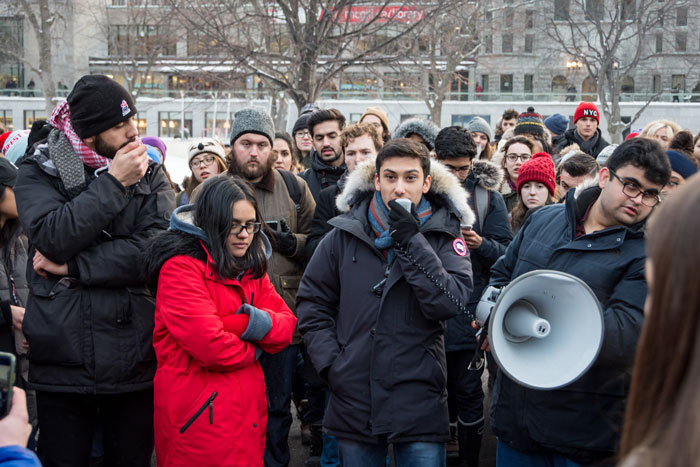On Friday, Jan. 27, U.S. President Donald Trump signed an executive order banning citizens of seven Muslim-majority countries from entering the U.S. for 90 days. Additionally, the order put a halt on all refugees for 120 days and Syrian refugees, specifically, for an unspecified period. Issued against Iran, Iraq, Libya, Somalia, Sudan, Syria, and Yemen, the ban has been the subject of protests around the world.
As complications caused by the actions of the executive branch of the American government unfold, Canadian universities have taken initiatives to address current and potential difficulties faced by their students, staff, and researchers. According to McGill Provost and Vice-Principal (Academic) Christopher Manfredi, academic members of the McGill community will be prevented from participating in important scholarly meetings in the U.S.
“We are very concerned about the consequences of the imposed travel restrictions,” Manfredi wrote in an email to The McGill Tribune. “Both with respect to the immediate effect on our students and researchers, who are citizens of the seven countries named in the executive order, […] and to the potentially detrimental and longer-term effect on institutional partnerships and scholarly exchange that are the bedrock of a 21st-century global academic community.”
Manfredi and his team seek to address the implications of the ban and how the university can support community members in need of help. Using an online form, the Office of the Provost has encouraged people to share how the executive order has impacted them and voice their opinions on how the university can respond. Further actions will be decided after reviewing the submissions received from the form, which remained open until Feb. 2. The university has already extended the Fall 2017 undergraduate, graduate, and continuing studies programs application deadlines until March 11 for students from the seven affected countries.
McGill law students were among the first to take immediate action to help those affected by the executive order. Led by third-year law student Sydney Warshaw, law students went to the Montreal Airport on Jan. 30 to ensure that legal aid was provided to those prevented from boarding U.S.-bound flights. According to Alec Angle, second-year law, the group hopes to identify how many people in Montreal have been affected by the ban.
Students have been encouraged by the Faculty of Law to write letters to the Minister of Justice, the Minister of Immigration, and their Members of Parliament to express their concerns. A campaign for writing letters was set up in the New Chancellor Day Hall Atrium, and the Faculty is considering establishing a legal clinic that will allow students to reach out for information.
“Basically, we want to ensure that the Government of Canada is proactive in dealing with the harms of the U.S. ban, even if our government has no power to change the policy itself,” Angle said. “We were able to write and mail about 100 letters on the first day of the campaign.”
Associate Dean of Graduate Studies Richard Gold has invited international students conflicted about applying to U.S. schools to instead apply to McGill by extending application deadlines for graduate programs. McGill’s law program qualifies students to write the bar exam in a number of U.S. states.
Some McGill students now risk being detained at the border while travelling to the U.S. for fellowships, internships, academic conferences, and job interviews. Concerns were recently raised over whether visiting students would be able to return home after McGill’s Model United Nations (McMUN) conference, held from Jan. 26 to Jan. 29. McMUN organizers reported that all delegates returned home safely.
At the Students’ Society of McGill University (SSMU) Legislative Council meeting on Feb. 9, a motion will be presented to decide whether external political advocacy should be mandated. SSMU will also donate to the Centre for Research-Action on Race Relations (CRARR) and plans to support future student initiatives in response to the executive order.
Other Canadian campuses aim to provide support as this situation continues to unfold. At the University of British Columbia (UBC), approximately 30 employees and 350 students are directly affected, according to UBC Managing Director of Public Affairs Susan Dandard. UBC has established a task force with the goal of determining what degree of assistance the university can offer those targeted by the ban. UBC is also working closely with McGill, the University of Toronto, and other Canadian universities to establish a coordinated approach to assist international scholars suffering from the travel restrictions.
“We could provide aid to students, faculty, and staff suffering hardship due to the travel restrictions,” Dandard said. “We are currently assessing the needs of our students, faculty, and staff. UBC’s administration sets aside money for contingencies like this. We are offering counselling services for anyone feeling distressed. We can also help faculty, staff, and student access immigration and travel advice.”









